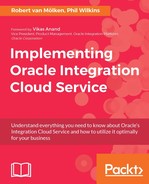ICS administration capabilities cover several areas, specifically:
- Managing SSL/TLS certificates
- System logging levels
- E-mail status reporting
These areas are more technical than the rest of ICS and can have implications for the behavior and performance of ICS, for example:
- Removing or changing certificates can result in connectors failing
- Changing the logging can impact ICS performance, but also makes the log files potentially harder to work with
As a result, the actions taken in this area should be done with care, and we would always advocate that before doing anything you understand and have the resources to allow you to revert configurations back to how they were.
The majority of the Administration view is given over to the management of SSL/TLS certificates. ICS has a range of preinstalled certificates reflecting the services that the adapters provided require, including the adapters to other Oracle Cloud services as you can see in the following screenshot:

The preinstalled certificates cannot be changed, and Oracle will maintain and update these as necessary. As it maybe necessary to also add our own certificates for when we are using technology adapters with third parties, we need to have the ability to upload and manage them. As you can see in the preceding screenshot, the ability to upload certificates is provided through a menu in the header section of the view. This will provide a dialog to help select the correct file and upload it. As certificates can expire or be revoked, there is a need to therefore upload replacements. This can be done through the use of the menu on the right-hand side of the list view (which in many respects looks a lot like the integrations view). Likewise, if you create your own adapter you may wish to add an additional new certificate, which can be done through the Upload button at the top right of the page.
By clicking on the Certificate icon or name, you see the details of the certificate as shown in the following screenshot:

It is important to remember that if you add your own certificates it is necessary to ensure that the certificate has not expired. Ideally, if a service provider (or owner of your own systems) revokes a certificate the provider would inform you, at which point it will be necessary to act by replacing the certificate, otherwise the integration will fail.
Note
If you are wondering why it is necessary to hold SSL certificates within ICS, it is worth remembering that when you visit a website which wants to use SSL, the web server and your browser go through a handshake process to establish the of an SSL certificate. This does not happen within an application, and rather than going through the process of negotiation the certificate can be deployed in advance, which is what is managed here.
When developing custom adapters or trying to diagnose a particularly challenging issue, sometimes it is desirable to tailor the log information recorded into the system log files. As Oracle (or any other user) does not want people trying to access the underlying technology platforms and manipulating configurations, a dashboard has been provided by which the log levels can be tailored. As the following screenshot shows, the log level can be changed to provide varying levels of information from the most critical incidents to very fine trace information:

The preceding screenshot does not cover all the classes that can have logging levels configured for. To exploit these controls, it will be necessary to understand the different technologies that Oracle has used to build ICS.
ICS provides the means to configure the emailing of activity and service failure notifications, such that in the event of a service failure the administrator(s) or delegated user(s) can be quickly informed of an issue that has been detected and appropriate intervention can be undertaken as shown in the following screenshot:

In addition to this, as the preceding screenshot shows, we can also receive daily or hourly activity reports. If you have just resolved an issue or have observed that a backlog of processing is occurring, it may be helpful to have hourly reports, otherwise daily reports should be sufficient. Of course, you can always use the API if you need bespoke reporting regimes (Next chapter covers the APIs). An example of an hourly report is shown in the following screenshot:

